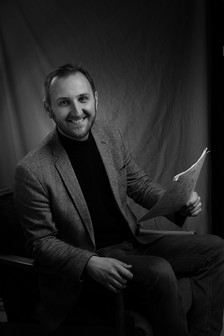
David Mastikosa (1992) is a younger generation Bosnian composer. He completed undergraduate and master studies at the Academy of Arts at the University of Banja Luka in the class of prof. Tatjana Milošević Mijanović, PhD. The same Academy elected him a teaching assistant in 2015, and later a senior teaching assistant at the Department of Musical Theory and Pedagogy in 2020.
Following the appearance of David Mastikosa’s music in the international circles, he has been receiving commissions from prominent artists and music festivals. His music was performed by artists and ensembles such as: Ensemble Metamorphosis, Stockholm Saxophone Quartet, Zagreb soloists, Kalamos quintet, and others. Mastikosa is the author of over 70 different compositions performed at festivals and events across the world, including the Music Biennale Zagreb (Croatia), Dani Vlade S. Miloševića (BiH), Vareš Classic Festival (BiH), Festivalis Druskomanija (Lithuania), World Music Day (USA), and AlbaNova (Belgium).
Currently, Mastikosa is completing his PhD studies of composition in the class of prof. Aleksandra Vrebalov at the Academy of Arts in Novi Sad. He is a long-term recipient of the scholarship awarded by the “Dr Milan Jelić” Fund. Mastikosa’s music is exclusively published by Donemus Publishing House of Contemporary Classical Music from the Netherlands. He is also an alumnus of the French talent school Académie musicale de Villecroze.
David Mastikosa lives, works and creates in Banja Luka.
About the piece
While reading Vuk Stefanović Karadžić’s collection of Serbian folk proverbs, I came upon the idea to “musicalise” certain proverbs and thus dress them in a new attire. When choosing the proverbs, I gave priority to the ones whose reflection is still noticeable in a modern day language used in Bosnia and Herzegovina, while at the same time paying attention to the narrative which they build together. I would say that nowadays we observe and hear less and less the wisdom and deeper meaning contained within the proverbs, while they mirror Serbian people’s character which is sometimes witty and cheerful. Therefore, Poslovice [Proverbs] for soprano, violin and cello, which incorporate elements of sound theatre, hide within them a humorous but true story which is read between the lines.


